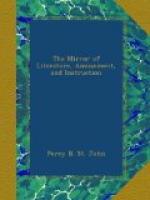* * * * *
PHRENOLOGY.
Mr. Crook, of the Phrenological Society, has just published a “Compendium of Phrenology,” which cannot fail to be acceptable to the ingenious inquirers after that very ingenious science. It is a lucid little arrangement of principles, and will materially assist them; but, for our part, we confess we would sooner take the public opinion of the contents of our cranium than that of a whole society of phrenologists; and if our head be as full as our sheet, we shall be content. But, joking apart, the little synopsis before us cannot be too highly recommended; and by way of hint to some friends who send us witty articles for “the Gatherer,” we take the following:—
“Wit. Primitive Power. Perception of the disjunction or incongruity of ideas; the analytical faculty. Uses: Separation of compound or general ideas into those that are elementary or more simple; knowledge of characteristic differences and discrepance. Abuses: A disposition to jest or ridicule; irony, sarcasm, and satire, without respect to truth, or the circumstances of person, place, or time. Organ, on the other side of Causality.
“It is not the definition of Wit, but the function of a particular portion of the brain at which I aim. Dr. Spurzheim, in some of his works, calls the faculty connected with this organ, ’the feeling of the ludicrous;’ in his later ones, ‘Gayness,’ and ‘Mirthfulness.’ But each of these is properly an effect, not a primitive power. The ludicrous owes its origin to the contrariety between the parts or means, as perceived by this faculty, and the general whole, or purpose, perceived by Comparison, or the necessary connexion perceived by Causality; and Gaiety, Mirth, and Laughter, arise from the mutual influence and reaction of the feelings. Some kinds of contrariety or incongruity excite one class of feelings, other kinds altogether different feelings; and consequently, according to the faculty or combination of faculties affected, the kinds of mirth and laughter are varied from the Sardonic grin of Destructiveness to the lover’s smile. This view of the origin of laughter enables us to give a satisfactory answer to the hitherto perplexing question, ‘Why is man the only laughing animal?’”
* * * * *
EPIGRAM
From the Greek Anthology, (Author unknown.)
BY THE REV. W. SHEPHERD.
If at the bottom of the cask,
Be left of wine a little flask,
It soon grows acid:—so when
man,
Living through Life’s most lengthened
span.
His joys all drain’d or turn’d
to tears,
Sinks to the lees of fourscore years,
And sees approach Death’s darksome
hour—
No wonder if he’s somewhat sour!
The Winter’s Wreath.
* * * * *




